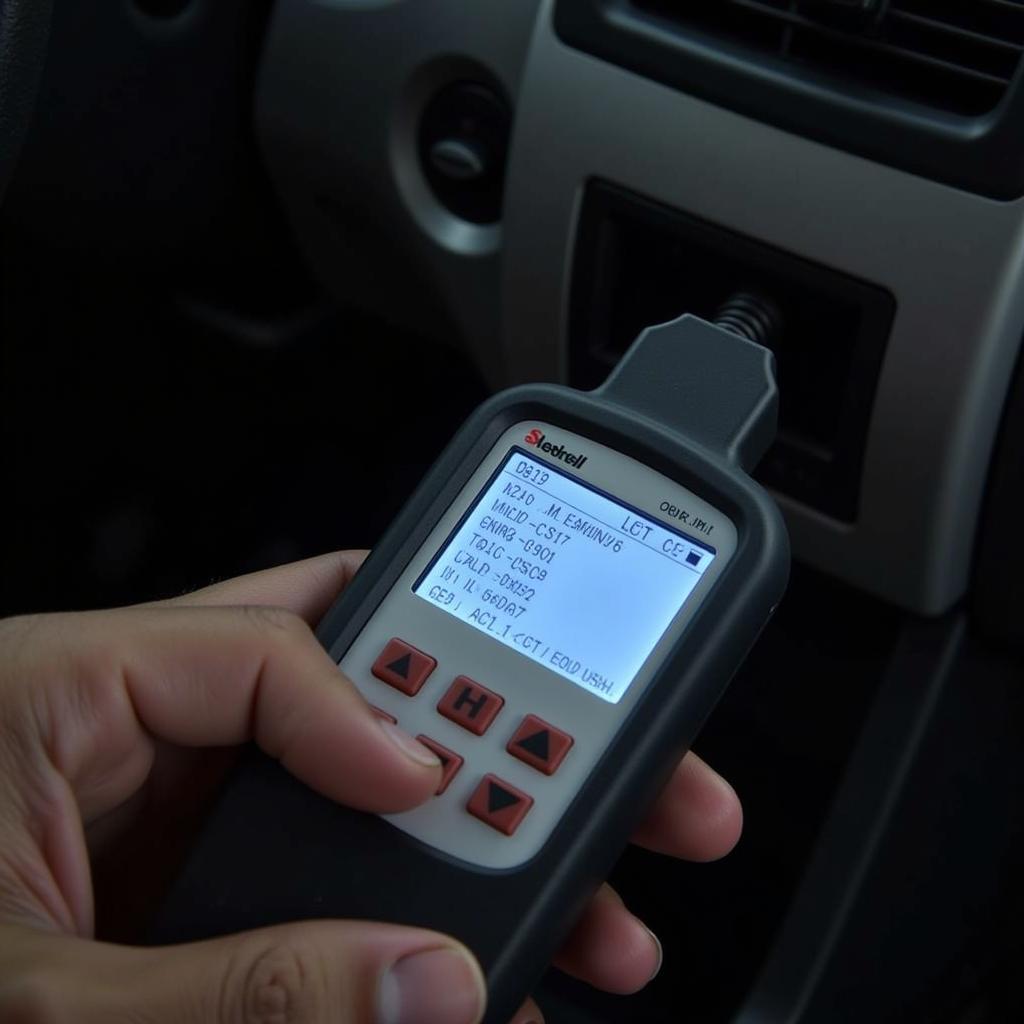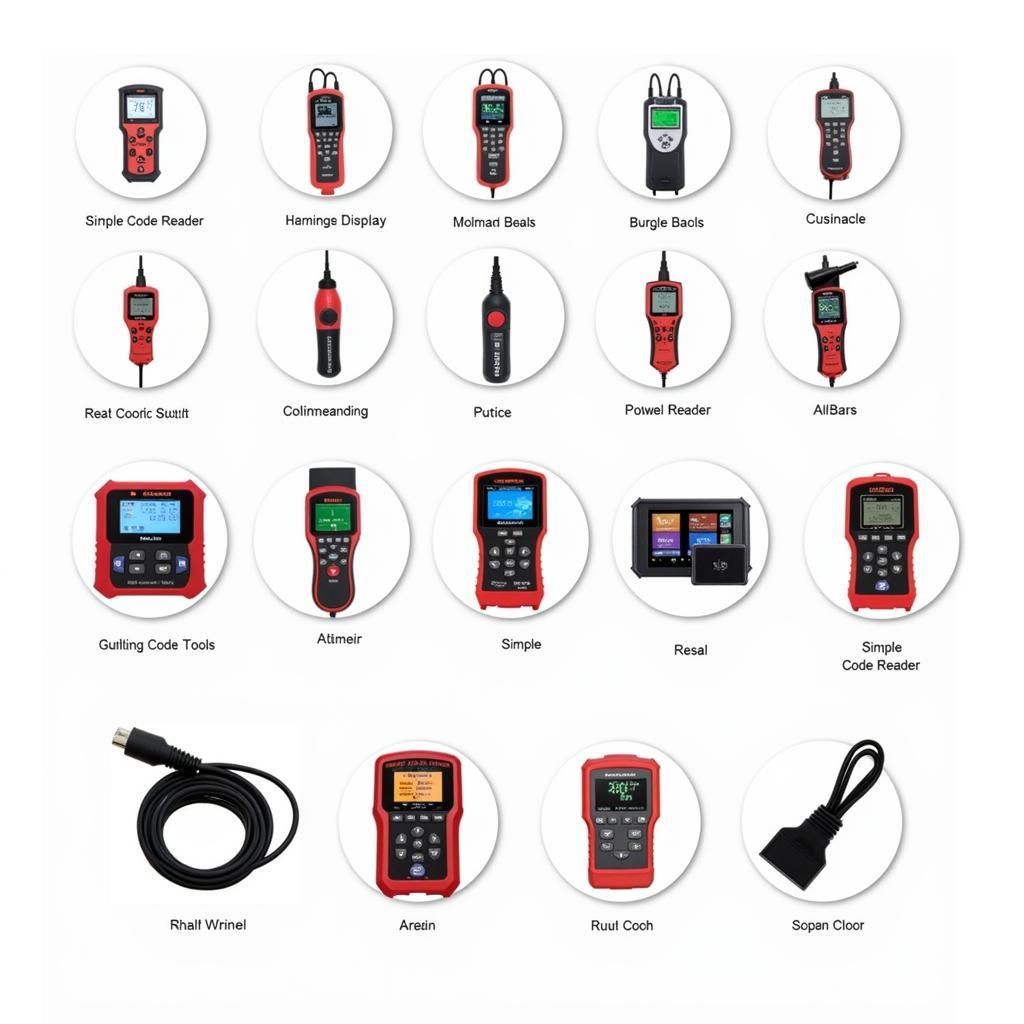Plug In Diagnostic Car tools have revolutionized how we understand and maintain our vehicles. These compact devices offer a wealth of information about your car’s systems, empowering you to troubleshoot issues, monitor performance, and even save money on repairs. Whether you’re a seasoned mechanic or a curious car owner, understanding the power of a plug in diagnostic car tool is essential in today’s automotive landscape. This article will delve into the world of plug in diagnostics, exploring their functionality, benefits, and various applications.
Understanding how a plug in diagnostic car tool works is the first step to unlocking its potential. These tools connect to your car’s OBD-II port, a standardized interface found in most vehicles manufactured after 1996. This port acts as a communication hub, allowing the diagnostic tool to access data from various electronic control units (ECUs) within the vehicle. These ECUs manage everything from engine performance and emissions to transmission shifting and safety systems. By tapping into this data stream, a plug in diagnostic car tool can retrieve diagnostic trouble codes (DTCs), providing valuable insights into potential problems. Some advanced tools even offer real-time data monitoring, allowing you to observe sensor readings, engine parameters, and other crucial information as you drive.
Accessing this data can empower car owners to take a more proactive approach to vehicle maintenance. Instead of relying solely on mechanics for diagnosis, you can identify potential issues early on, potentially preventing costly repairs down the road. Imagine knowing about a failing oxygen sensor before it causes further damage to your catalytic converter – a plug in diagnostic car tool can make this a reality.
 Plug in diagnostic car tool connected to OBD-II port
Plug in diagnostic car tool connected to OBD-II port
Decoding the Data: Understanding Diagnostic Trouble Codes
One of the primary functions of a plug in diagnostic car tool is to retrieve and interpret DTCs. These codes are standardized across different car makes and models, providing a universal language for understanding vehicle problems. Each code corresponds to a specific fault or malfunction within a particular system. For instance, the code P0420 indicates a potential problem with the catalytic converter system. By understanding these codes, you can pinpoint the source of the issue and take appropriate action.
However, it’s crucial to remember that DTCs are not definitive diagnoses. They are indicators, pointing you in the right direction for further investigation. A professional mechanic with specialized knowledge and tools will often be necessary to perform a thorough diagnosis and repair.
plug in engine diagnostic tool for cars offer an incredible amount of information for those who know how to use them.
Beyond Diagnostics: Advanced Features and Functionality
Modern plug in diagnostic car tools offer a range of features beyond basic code retrieval. Some tools provide real-time data monitoring, displaying live sensor readings, engine parameters, and other crucial information. This can be incredibly valuable for performance tuning, allowing you to monitor changes and optimize your vehicle’s settings. Other advanced features include emissions testing readiness checks, data logging capabilities, and even the ability to reset certain warning lights.
What are the benefits of using a plug in diagnostic car tool?
Using a plug in diagnostic car tool offers several benefits:
- Early Problem Detection: Identify potential issues early, preventing costly repairs.
- Empowered Maintenance: Take a proactive approach to car care and maintenance.
- Cost Savings: Reduce diagnostic fees and potentially avoid unnecessary repairs.
- Increased Knowledge: Gain a deeper understanding of your vehicle’s systems.
- Performance Monitoring: Track performance data and optimize vehicle settings.
Choosing the Right Tool: Navigating the Market
The market for plug in diagnostic car tools is vast and varied, with options ranging from basic code readers to professional-grade scan tools. When choosing a tool, consider your needs and budget. Basic code readers are affordable and suitable for retrieving DTCs, while more advanced tools offer additional features like live data monitoring and bi-directional control. ocs car diagnostic for plug in to carsterminal is a good example of the different tools on the market.
plug in car diagnostic tool with app is becoming increasingly popular.
Conclusion: Embracing the Power of Plug In Diagnostics
Plug in diagnostic car tools have transformed the automotive landscape, empowering car owners and mechanics alike. From basic code retrieval to advanced data analysis, these tools provide valuable insights into vehicle health and performance. By understanding the capabilities and benefits of a plug in diagnostic car tool, you can take a more informed and proactive approach to car ownership, ensuring optimal performance and potentially saving money on repairs. car temperature gage of the diagnostic plug allows you to access important information.
FAQ
- What is a plug in diagnostic car tool? A plug in diagnostic car tool is an electronic device that connects to your car’s OBD-II port to retrieve diagnostic trouble codes and other vehicle data.
- Where is the OBD-II port located? The OBD-II port is typically located under the dashboard, near the steering column.
- What can a plug in diagnostic car tool tell me? It can tell you about diagnostic trouble codes, sensor readings, engine parameters, and other crucial vehicle data.
- Do I need a professional mechanic to use a plug in diagnostic car tool? No, but a mechanic is often needed for a full diagnosis and repair.
- How much does a plug in diagnostic car tool cost? Prices vary depending on the features and functionality, ranging from affordable code readers to professional-grade scan tools.
plug in diagnostic tool for cars is a great starting point for learning more about these tools.
 Different types of plug in diagnostic car tools displayed on a table
Different types of plug in diagnostic car tools displayed on a table
Here are some other articles that you might find helpful:
- How to Use a Plug-In Diagnostic Tool
- Choosing the Right Diagnostic Tool for Your Car
- Understanding Diagnostic Trouble Codes
Need help with car diagnostics? Contact us via WhatsApp: +1(641)206-8880, Email: [email protected]. We have a 24/7 customer support team.

Leave a Reply